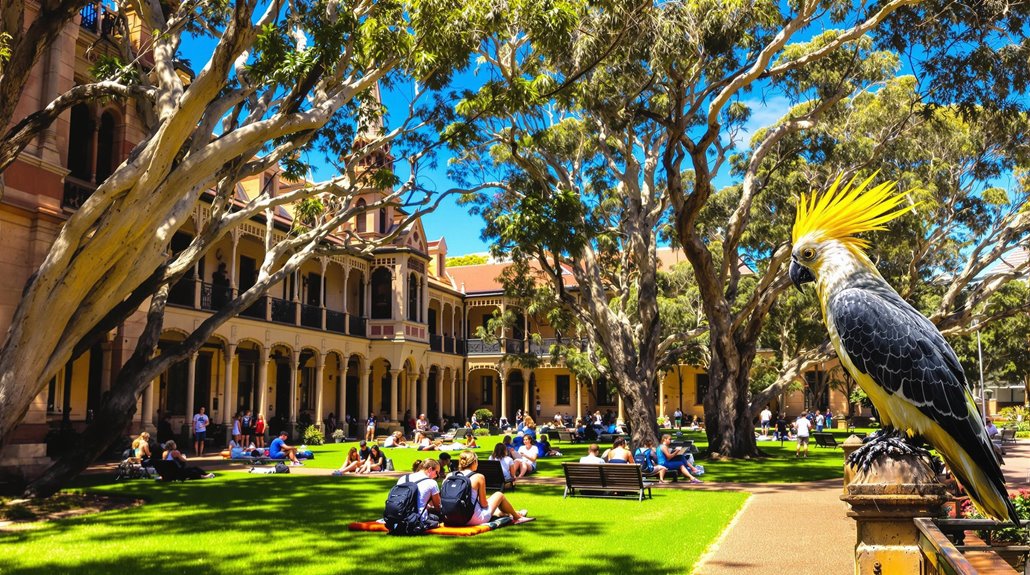You'll need to navigate key practicalities when studying in Australia: securing your student visa (with A$24,505 proof of funds), finding accommodation early (only 10% on-campus), managing living costs (A$1,774 monthly), and adapting to the academic calendar (February-November). You can work up to 48 hours per fortnight, earning at least A$34.64/hour. With extensive public transport, world-class universities, and unique cultural experiences, Australia offers countless opportunities to enrich your educational journey.
- Key Points
- Understanding the Australian Student Visa Process
- The Academic Calendar in Australia
- Cost of Living and Student Expenses
- Choosing the Right Australian University
- Finding Student Accommodation
- Healthcare Coverage Requirements
- Australian Cultural Norms and Etiquette
- Part-Time Work Opportunities While Studying
- Public Transportation and Getting Around
- Weather and Climate Differences
- Banking and Money Management Tips
- Student Support Services and Resources
- The Last Word
Key Points
- Students must demonstrate financial capacity of A$24,505 annually and obtain mandatory health insurance (OSHC) before visa approval.
- International students can work up to 48 hours per fortnight during term time with a guaranteed minimum wage of A$34.64/hour.
- Most universities operate on a two-semester system (February-June, July-November), with orientation weeks typically held January through March.
- Monthly living costs average A$1,774, with Canberra being the most expensive city at A$4,310 per month.
- Major cities offer extensive public transport networks, with Sydney's metro system and Melbourne's world-largest tram network facilitating student mobility.
Understanding the Australian Student Visa Process
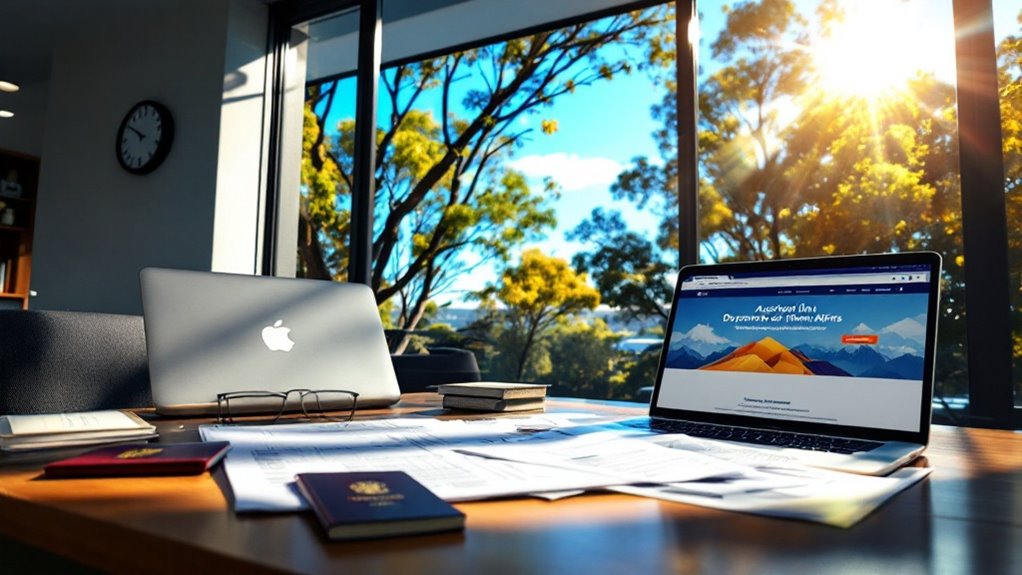
Before you can begin your academic journey in Australia, steering through the student visa process is your essential first step.
You'll need to secure two critical documents to establish your eligibility: a Confirmation of Enrolment (CoE) from your chosen Australian institution and proof that you meet the Genuine Temporary Entrant (GTE) requirement.
The CoE verifies your acceptance into a registered course, while the GTE demonstrates your genuine intent to study temporarily in Australia and return home after completing your studies.
Two vital requirements: a CoE to confirm enrollment and a GTE to prove your intent to study temporarily in Australia.
You must also show financial capacity by proving you have access to at least A$24,505 per year to cover your living expenses. The processing time for evaluating your application typically takes 4-6 weeks after submission.
Don't underestimate these requirements – they're strictly enforced, and your visa application won't progress without meeting each criterion.
The Academic Calendar in Australia
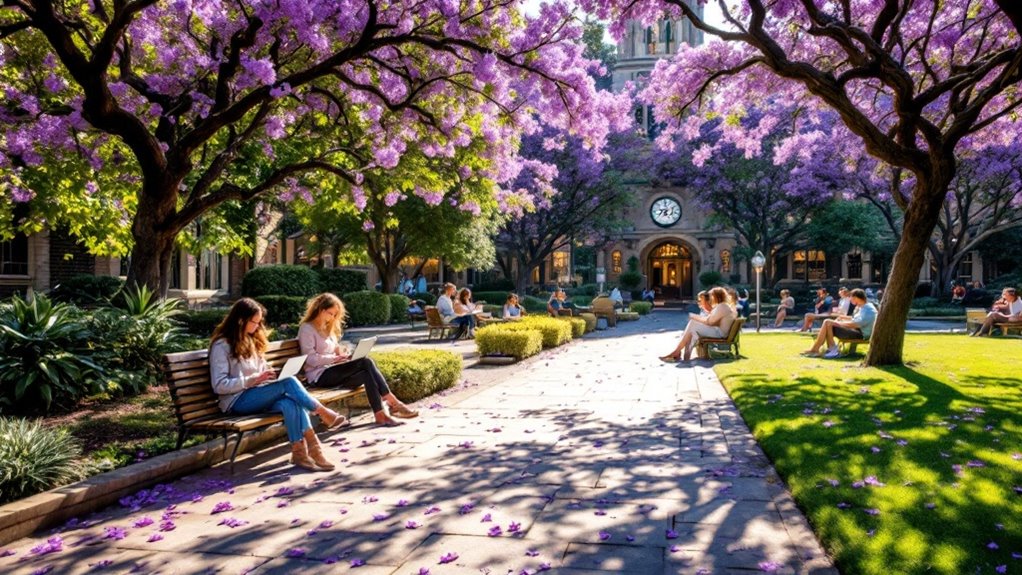
When planning your Australian study adventure, you'll need to adapt to an academic calendar that differs markedly from many other countries. Most Australian universities follow a two-semester system, running from February to June and July to November. However, some institutions like Bond University operate on a three-semester model.
You'll encounter critical dates you can't ignore: census dates determine your fee liability, and withdrawal deadlines vary by institution. Mark your calendar for orientation weeks, typically held in January through March, when you'll complete enrollment and attend essential events.
Keep in mind that public holidays like Australia Day and ANZAC Day may affect class schedules. The summer semester break provides an excellent opportunity to explore Australia between December and February.
If you're an international student, you'll need to maintain continuous enrollment to comply with visa requirements, though summer semesters offer opportunities to accelerate your studies.
Cost of Living and Student Expenses

Living costs in Australia demand careful financial planning across four major categories: daily expenses, accommodation, healthcare, and education.
Success in Australia starts with smart budgeting across essential areas: daily living, housing, medical care, and schooling.
You'll need roughly A$1,774 monthly for basics like food, transport, and utilities, with costs varying by 15% between cities. Canberra tops the expense chart at A$4,310 monthly, while Sydney and Melbourne follow at A$3,982 and A$3,778 respectively.
Your tuition will range from A$5,500 to A$370,500 annually, depending on your program. More affordable cities like Bendigo and Wagga offer significant cost savings for students.
Don't forget mandatory health insurance at A$118 monthly, plus one-time costs like flights (A$1,500) and visa fees (A$653).
To offset expenses, you can work part-time at A$20-25 hourly. Plan for A$300-500 weekly spending, and consider that urban areas cost A$1,500 more monthly than regional cities.
Choosing the Right Australian University
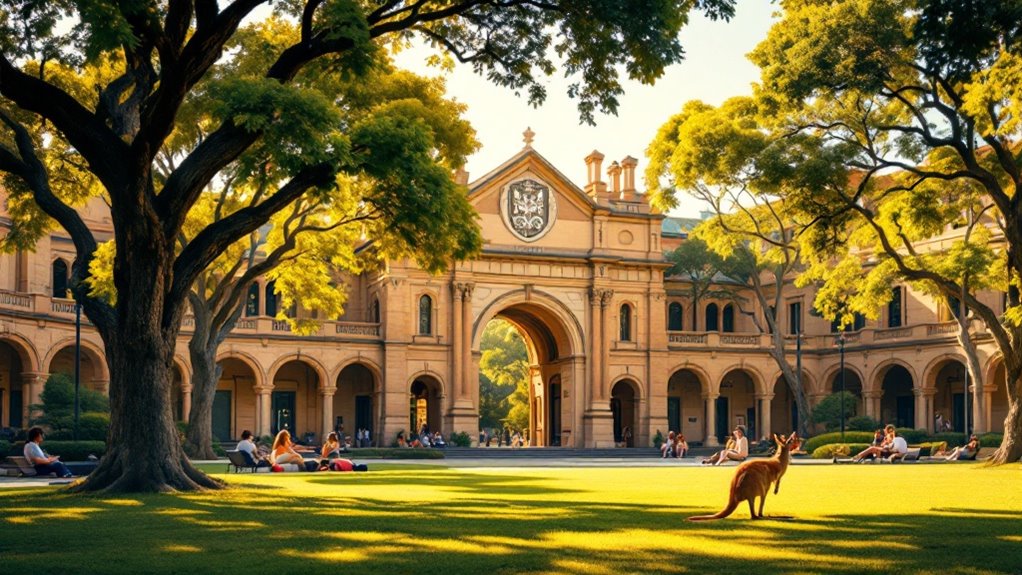
Selecting an Australian university requires maneuvering through the country's diverse higher education landscape, from world-class research institutions to specialized vocational colleges.
You'll find 39 universities offering programs across all academic levels, with institutions like Melbourne and Sydney ranking in the global top 20.
- Gain global recognition with a degree from Australia's top-ranked universities, boosting your career prospects worldwide
- Access specialized ESL programs to build your language skills before pursuing higher education
- Fast-track your career through VET/TAFE programs that combine practical skills with academic knowledge
- Explore semester-long exchange opportunities through established institutional partnerships
- Consider private colleges for shorter programs with potential university credit transfers
Your choice should align with your academic goals, whether that's conducting research at a prestigious university or gaining hands-on experience through vocational training.
Consider each institution's QS rankings and specialized programs to make an informed decision.
With a multicultural atmosphere, Australia provides an ideal environment for international students looking to improve their English skills while pursuing their education.
Finding Student Accommodation
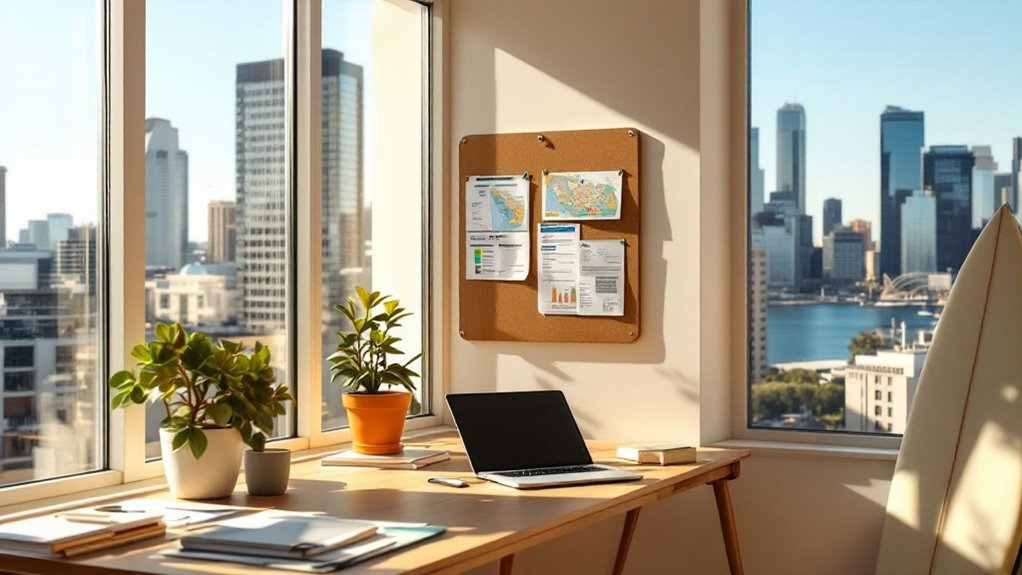
As international student numbers surge across Australia, securing suitable accommodation has become increasingly competitive, with demand far outpacing supply in major university cities.
You'll find two main housing paths: on-campus and off-campus options.
On-campus housing, while offering proximity to classes and better integration into university life, is limited to just 10% of total beds. You'll need to apply early through university portals to secure these spots.
Campus housing offers prime location and student life perks but fills just 10% of spaces. Early applications are essential.
Off-campus alternatives dominate the market, with private purpose-built student accommodation (PBSA) and shared rentals being your primary options. With 132,700 student accommodation beds currently available nationwide, options vary significantly by region.
In Sydney and Melbourne, where vacancy rates are below 2%, you'll face significant competition.
Consider temporary solutions like hostels while searching for permanent housing, and factor in rising rental costs, which have grown 6% annually since 2018.
Healthcare Coverage Requirements

While studying in Australia, you'll need Overseas Student Health Cover (OSHC), a mandatory insurance requirement tied directly to your student visa application.
You won't get your visa without proof of OSHC coverage, which must be purchased before arriving in Australia. While Belgium, Norway, and Sweden have exemptions through reciprocal agreements, most students must comply with standard OSHC rules.
- Don't risk your health or visa status – secure your OSHC early
- Protect yourself from unexpected medical expenses that could derail your studies
- Choose from trusted providers like Allianz for 24/7 support
- Get peace of mind with coverage for basic medical care and hospitalization
- Stay focused on your education instead of worrying about healthcare costs
Your OSHC must align exactly with your visa dates, and you'll need supplemental insurance for non-covered services like dental and extensive ambulance care. Getting your OSHC through UQ allows you to receive your Confirmation of Enrolment immediately after acceptance.
Australian Cultural Norms and Etiquette

Understanding Australian cultural norms will help you navigate social situations with confidence and respect. Punctuality matters, especially in professional settings where you'll need to arrive on time or notify hosts if you're running more than 10 minutes late.
Show up on time for business in Australia – respect runs on a schedule here.
For social gatherings, you'll have about a 30-minute grace period after the stated start time. It's polite to check if you should bring a plate when attending BBQs or casual gatherings.
When dining out, use continental-style etiquette and expect to split bills by individual orders. In group settings, you're expected to participate in "rounds" when drinking. Don't tip unless the service is exceptional.
On public transport, always wait for passengers to exit before boarding, and never cut queues.
When discussing Indigenous peoples, use specific regional terms like "Koori," "Murri," or "Nunga" rather than general terms that might cause offense.
Part-Time Work Opportunities While Studying

Three key factors make part-time work in Australia an attractive option for international students: flexible visa regulations, competitive wages, and strong worker protections.
You'll find diverse opportunities ranging from tutoring at $30/hour to customer service roles offering $4,000 monthly. While most students can work up to 48 hours per fortnight during term time, PhD and Master's research students enjoy unlimited hours. During holiday breaks, students can maximize their earnings with unlimited working hours permitted.
- Your skills can earn you premium wages as a tutor, sharing knowledge while building your resume.
- You're legally protected with a guaranteed minimum wage of $34.64/hour in urban areas.
- You'll gain valuable local work experience while supporting your studies.
- You're entitled to safe working conditions and protection from discrimination.
- You'll build lasting professional connections through university career services and job fairs.
Public Transportation and Getting Around

Australia's major cities offer extensive public transport networks that'll get you wherever you need to go during your studies.
You'll need to obtain a city-specific transport card – Opal for Sydney, myki for Melbourne, Go Card for Brisbane, or Metro Card for Adelaide – which you can purchase at stations or online.
Trains connect all major cities, with frequent services in urban areas.
Sydney boasts Australia's only metro system, while Melbourne features the world's largest tram network.
You'll find ferries operating in Sydney Harbor, Brisbane's rivers, and Perth's Swan River.
Distance-based fares start from $2.10, and you can secure student concessions with proof of enrollment.
For regular travel, consider monthly passes that charge by zone rather than distance.
Buses complement these networks, particularly in suburban areas where other services are limited.
Mobile apps provide real-time travel updates to help you plan your journey efficiently.
Weather and Climate Differences
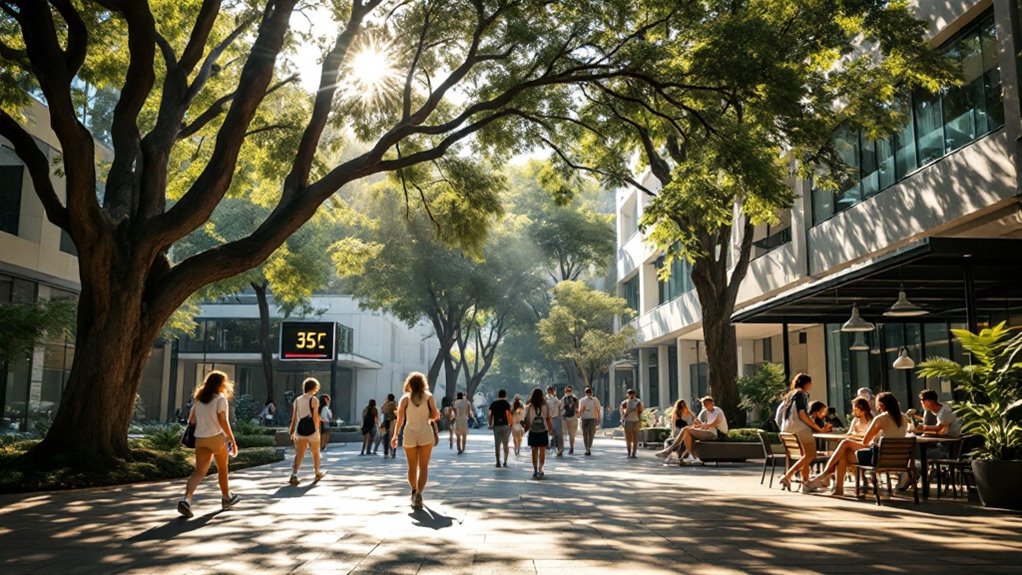
When planning your Australian study abroad experience, you'll need to adjust your seasonal expectations entirely. December through February marks Australian summer, while the U.S. experiences winter.
You'll encounter diverse climates, from tropical Queensland's monsoons to Tasmania's cool maritime weather. Based on the program's focus on diverse natural environments, you'll experience firsthand the varying ecosystems from rainforests to deserts.
- Pack for extreme temperature swings in the Outback, where 118°F days can plummet to 32°F nights.
- Prepare for Byron Bay's subtropical warmth and sudden tropical downpours from January to May.
- Consider Melbourne's unpredictable weather, where heatwaves can reach a scorching 115°F.
- Watch for cyclone warnings in the north during November through April.
- Bring rain gear if studying in Tasmania, where some areas receive up to 90 inches of annual rainfall.
Remember to check your destination's specific climate patterns, as conditions vary dramatically between coastal, inland, and southern regions.
Banking and Money Management Tips
Managing your finances effectively requires setting up a local Australian bank account before or shortly after arrival. Major banks like Westpac, ANZ, and Commonwealth offer student-specific accounts with fee-free transactions and extensive ATM networks.
Opening an Australian bank account is essential for students, with major banks offering dedicated accounts featuring zero-fee services.
You'll need your passport, visa, and Confirmation of Enrollment to open an account. Most banks provide free budgeting tools to help students manage their money effectively.
Track your spending through bank-provided apps and maintain an emergency fund covering 1-3 months of expenses.
When withdrawing money, use partner ATMs to avoid fees, but be aware of the 3% foreign exchange charge plus $5 fee for international transactions.
If you're planning to work, apply for a Tax File Number immediately – you won't pay tax on earnings up to $18,201.
Remember to stay within the 20-hour fortnightly work limit during semester periods.
Student Support Services and Resources
Successful study abroad experiences rely heavily on extensive support systems, which Australian universities excel at providing.
You'll find thorough orientation programs, academic skills workshops, and dedicated international student support units ready to assist with everything from visa concerns to accommodation.
The government maintains a free student hotline (1300 363 079) for confidential advice, while institutions offer free counseling services to help you navigate cultural adjustment and academic stress. Understanding the difference between a High Distinction and Pass in the Australian grading system is crucial for academic success.
- Access free legal advice through Redfern Legal Centre to protect your rights
- Join student clubs to build lifelong friendships and cultural connections
- Utilize OSHC health coverage for peace of mind during your stay
- Connect with experienced mentors who understand your journey
- Tap into career services that help plan your future success
The Last Word
Like steering a ship through the Great Barrier Reef, you'll need precise planning to make your Australian study adventure a success. You've now got the essential tools – from visa know-how to banking basics – to chart your course down under. Pack these insights in your mental suitcase, and you're ready to join the ranks of savvy international students who've made Australia their academic home.

